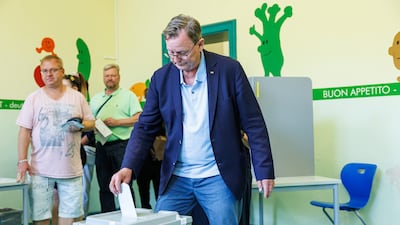Germany's far-right Alternative for Germany party (AfD) has won its first regional election in the former East German state of Thuringia, taking between 32 and 33 per cent of the vote, exit polls showed on Sunday.
In neighbouring Saxony, projections put support for the Christian Democratic Union of Germany party (CDU), which has led the state since German reunification in 1990, at 31.5-31.8 per cent and AfD on 30.8-31.4 per cent.
The new Sahra Wagenknecht Alliance, or BSW, took up to 16 per cent of the vote in Thuringia and 12 per cent in Saxony.
Protests against the far right in Germany – in pictures
“This is a historic success for us,” Alice Weidel, a national co-leader of AfD, told German broadcaster ARD. She described the result as a “requiem” for Chancellor Olaf Scholz's coalition.
The CDU's national general secretary, Carsten Linnemann, said that “voters in both states knew that we wouldn't form a coalition with AfD, and it will stay that way – we are very, very clear on this”.
Ms Weidel denounced that as “pure ignorance” and said that “voters want AfD to participate in a government”.
“An openly right-wing extremist party has become the strongest force in a state parliament for the first time since 1949, and that causes many people very deep concern and fear,” said Omid Nouripour, a leader of the Greens, one of the national governing parties.
Despite the results, a custom in German politics that prevents parties from collaborating with the far-right, known as a firewall, will be tested.
The party would be unable to form a state government as it lacks the required majority, and other parties would be unwilling to go into coalition with it.
Both the AfD and BSW are anti-migration, Eurosceptic, pro-Russia and are particularly strong in the former Communist-run East, where concerns about a cost of living crisis, the Ukraine war and immigration run deep.
The results come after Germany unveiled stricter measures on asylum seekers, in the wake of an ISIS-inspired attack by a Syrian citizen in Solingen.
The package unveiled by Mr Scholz included stripping the asylum status for refugees who return home on holiday.
The elections are two of the three regional elections planned in East Germany, and the results will serve as an indicator for the general elections in September 2025.
'Stop calling voters Neo Nazis'
The growth of the AfD’s popularity was a sign that mainstream politicians were not taking voters seriously enough, according to a German diplomat.
“We should stop calling the voters Neo Nazis. These are people who protest with their vote. So we have to take this seriously, and we have to try to address that,’ said German ambassador to the UK Miguel Berger on Sunday.
“We should not forget that more than half of people don’t vote for the extremes,” he told Sky News.
Another risk is that mainstream parties could start to mirror policies proposed by the far-right.
Germany deported 28 Afghan asylum seekers back to Afghanistan on Friday, with Syrians set to be next.
“We had a terrible terrorist attack by a Syrian refugee, which has highlighted the necessity that we need to be able to deport criminals who came among the asylum seekers,” Mr Berger said.
“What we need is really a possibility to deport those who have been criminals and to integrate the others, so we want to make both.”

























